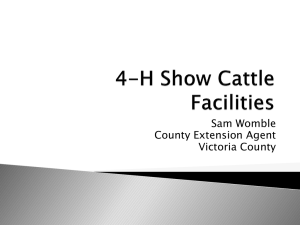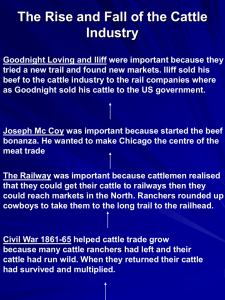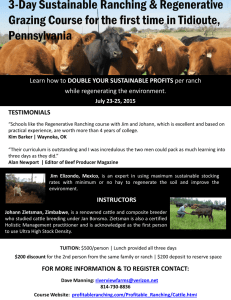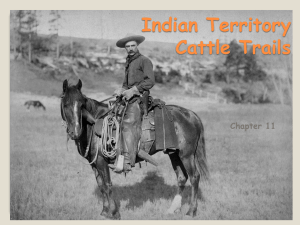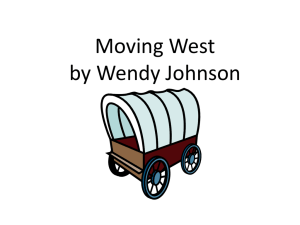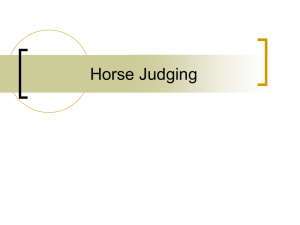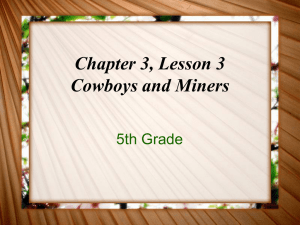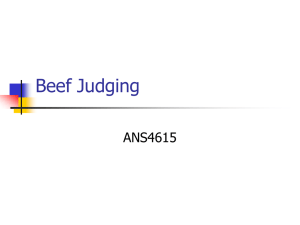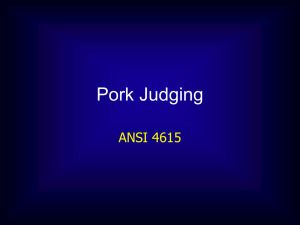Judging Beef Cattle
advertisement
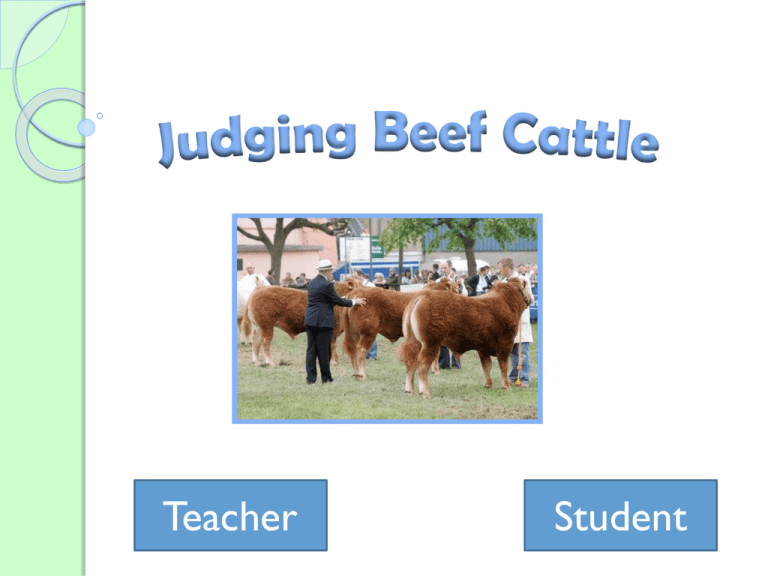
Teacher Student Teacher’s Page Learning Objectives ◦ Given two pictures of different cattle, students will be able to determine which one has more muscling with 100% accuracy. ◦ Given two choices, students will be able to determine which one is not a leg structural problem with 100% accuracy. ◦ Given an external diagram of a beef cow, students will be able to locate the dewclaw with 100% accuracy. ◦ Given tow pictures, students will be able to determine which animal has the deepest body with 100% accuracy. ◦ Given two pictures, students will be able to determine which one show a bowlegged cow with 100% accuracy. Teacher’s Page Learners ◦ High school students in grades 9-12. The learners are in an agriculture class that focuses on animal science. Within the class, students are learning about bee cattle and how to judge them. Each of the learners will have access to a computer to use to complete this materials. Teacher’s Page Environment ◦ In order to complete this material, the learners will be going to a computer lab so that each one has an individual computer. The lab will be kept quiet so that each student can focus on the learning. Go Back to Beginning Why study beef cattle judging? In this video, the importance of learning how to judge beef cattle is described. This knowledge is not only needed in the show ring, but also when raising cattle for maximum profit. Menu • Judging Importance • Structure • Body Parts • Structure cont. • Cattle Frame • Review • Muscling • Quiz • Volume • References I. Body Parts Before you start judging, you must know the parts of the animal. Study this diagram to learn the parts. Be prepared for some questions on the quiz. II. Cattle Frame In order to be market ready, cattle need to have a final weight in the range of 1250-1300 pounds, and a carcass weight in the range of 700-850 pounds. Other than weight, other things to look for when determining frame size is height at the top of the hip, total length of body, and the size and length of the cannon bone. large small medium III. Muscling The next thing to look at is the animal’s muscle mass. Essentially, the more muscle there is on the animal’s body, the meat there is. You should be able to determine the amount of muscling by looking from the animal’s backside to see how wide it is, looking at the hind quarters, looking at the top of the animal, and looking at the loin, hip, and stifle areas. This is a good example of muscling. APPLY WHAT YOU JUST LEARNED! Click on the picture that shows the correct muscling. CORRECT! This is a cow with an example of correct muscling. GOOD TRY! This is not a correct example because you can see the rips in this animal. You don’t want to see the ribs in a beef animal because this means they are not putting on enough weight. ribs Go Back To Question APPLY WHAT YOU JUST LEARNED! You should have chosen this picture. IV.Volume In able to be the best performers, beef cattle need to be deep bodied and have a wide chest floor. These characteristics describe an animal that can eat large amounts of feed. This is an example of what these characteristics look like. wide chest floor deep body V. Structure Leg and feet placement is also very important in the production of beef cattle. Cattle can have front and rear problems with their feet and legs. Study this diagram of different types of rear leg placement. Extremely straight Extremely curved Correct bowlegged Cow hocked V. Structure cont. Now that you’ve studied the rear placement, look at this diagram for the front feet and leg placement. The same rules apply to the front placement as the rear placement. Back at the knee (calf kneed) Correct Over at the knee (buck kneed) Bowlegged Knocked-kneed Weak pasterns Splayfooted (toe out) Pigeon-toed (toed in) APPLY WHAT YOU’VE JUST LEARNED! If you were a farmer, why would it be important for your cattle to have good feet and leg structure? so that the cattle can grow properly b. to prevent cattle frame issues c. so that cattle can reproduce without problems d. all of the above a. CORRECT! You made a great choice as a farmer! TRY AGAIN! Guess Again! Go Back To Question APPLY WHAT YOU’VE JUST LEARNED! If you were a farmer, why would it be important for your cattle to have good feet and leg structure? so that the cattle can grow properly b. to prevent cattle frame issues c. so that the cattle can reproduce without problems You should have chosen this answer because all d. all of the above of these qualities are a. needed for a good herd. Review: Watch this video to review the information before the quiz. Question 1: Click the picture that shows the cow with the most muscling. CORRECT! This is a correct example of muscling. The heifer is very muscular throughout the shoulder and has very little fat. good muscling Whoops…Good Try! This is not a good example of muscling. This heifer does not have as much muscle as the black heifer. Go Back To Question Question 2: Which picture does not show a foot or leg problem? CORRECT! This cow does not have any feet or leg problem. Good Try! This cow has a leg and foot problem called knocked-kneed. Go Back To Question Question 3: Click on the correct box number that is in the location of the dewclaw. 1 2 3 4 CORRECT! You have found the correct location of the dewclaw. Nice Try! This is not the correct location of the dewclaw. Go Back To Question Question 4: Which cow has the deepest body? CORRECT! This is an example of the desired body depth in beef cattle. correct body depth Good Try! This heifer does not have the desired body depth. Shallow body depth Go Back To Question Question 5: Which picture shows a bowlegged cow? CORRECT! This is an example of bowlegged feet and legs on a beef animal. hooves turn in Try Again! This is not an example of bowlegged feet and legs. Instead, it is an example of cow hocked feet and legs. hooves turn outward Go Back To Question References Information ◦ http://www.sdstate.edu/ars/students/activities/judging/evaluation/upload/LivestockJudgingManual.pdf ◦ http://extension.uidaho.edu/blaine/Cindy’s%Articles/Judging%20Beef%20Cattle%20101[1].pdf Pictures ◦ http://www.sdstate.edu/ars/students/activities/judging/evaluation/upload/LivestockJudgingManual.pdf ◦ http://extension.uidaho.edu/blaine/Cindy’s%Articles/Judging%20Beef%20Cattle%20101[1].pdf ◦ http://www.bar5.com/animals/bulls/salerika.htm ◦ http://www.musclechemistry.com/upload/female-fitness-bodybuilding-31304-skinny-beef.html ◦ http://absbeef.wordpress.com/tag/beef-cattle/ ◦ http://www.advantagecattle.com/ACSassociates/Twinoaks/herdsire1916.htm ◦ http://www.sdstate.edu/ars/students/activities/judging/evaluation/upload/LivestockJudgingManual.pdf ◦ http://www.oneillangusfarm.com/fall_female_bid_off.html ◦ http://www.gklivestock.com/sales.htm ◦ http://www.stclaudevetclinic.com/pages/simple-page3 ◦ http://www.steerplanet.com/bb/cattle-for-sale/group-of-show-steers-for-sale-in-ky-truck-headed-to-sd-and-ia-next-week/ ◦ http://www.docstoc.com/docs/52995399/Parts-of-the-Beef-Steer ◦ http://www.clemson.edu/edisto/beef/beef.htm ◦ http://www.hobbsfarmscattle.com/ ◦ http://www.brahman.com.au/technical_information/selection/structureAndLameness.html ◦ http://bestclipartblog.com/32-farm-clip-art.html/farm-clip-art-3 Video ◦ http://www.youtube.com/watch?v=GCLMVW522X8 Click to End
